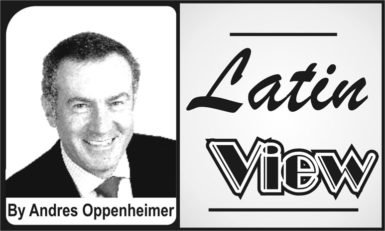
According to the just-released “Freedom in the World 2017” report, which scores countries’ freedoms on a scale from 1 to 100 and ranks them as “free,” “partly free” or “not free,” the United States was a “free” nation in 2016, with an overall score of 89. It shared that category with Finland (100), Sweden (100), the United Kingdom (94) and about 80 other countries.
But the United States dropped from 37th place in the ranking last year to 48th this year.
“In 2016, populist and nationalist political forces made astonishing gains in democratic states,” the report said. It added that “Trump’s positions during 2016 raised fears of a foreign policy divorced from America’s traditional strategic commitments to democracy, human rights and the rules-based international order.”
When I asked the Freedom House report’s lead author, Arch Puddington, whether press freedoms were a major focus of the study, he said a separate Freedom House report focusing on press freedoms is due in May.
“I would suspect that the American press freedom score will decline for the year 2017,” he told me.
He added that “there have been no institutional threats on the media, such as making it easier to file libel suits, or setting up media censorship committees, like has been done in Russia. But Trump and his press secretary have denounced the media in ways that no president in my lifetime has done.”
Indeed, since his Jan 20 inauguration, Trump has accused the New York Times, the Washington Post and CNN, among others, of “fake news.” Trump’s top strategist Stephen K Bannon said on Jan 25, “The media should be embarrassed and humiliated and keep its mouth shut. … The media here is the opposition party.”
Some may find this to be a trivial side effect of Trump’s impulsive personality, or a legitimate exercise of a president’s right to fight back against press reports he considers unfair. But those of us who have followed Latin American affairs for decades know very well that government attacks on the media sooner or later curtail independent thinking.
Much like Trump rails against whichever news organization dares to call into question his near-daily blatant lies — whether it’s about the size of the crowd that attended his inauguration or his false claim that “millions” of undocumented immigrants voted against him — demagogues in Venezuela, Argentina and Ecuador have used exactly the same language against the media in recent years.
They have all called leading opposition newspapers “liars,” and branded the media as the “opposition” party. Former Argentine President Cristina Fernandez de Kirchner’s leading slogan, referring to her country’s largest circulation newspaper, was “Clarin miente” (Clarin lies.)
Pablo J Boczkowski, a professor of communications at Northwestern University who authored a recent study on the impact of the Fernandez government’s attacks on Clarin, told me that such systematic attacks on news organizations in the long run erode those news outlets’ credibility with nonpartisan readers.
In Argentina, Fernandez’s daily verbal onslaughts against Clarin, which had a politically diverse following, drove down the newspaper’s audience from 380,000 in 2008 to 232,000 in 2014. By comparison, the readership of La Nacion, which had a more uniformly opposition audience, fell only marginally, from 158,000 to 155,000 copies during the same time period, according to his study.
“The Argentine experience shows that attacking a news organization is a politically effective tactic,” he told me. “It solidifies the president’s base, and erodes or puts in question the independent media’s credibility.”
My opinion: It’s true that Trump has not taken any steps to institutionally curtail press freedoms. But his daily verbal attacks on the media are aimed at sowing confusion, so that nobody knows anymore what’s true and what’s a lie. And when nobody believes anything any longer, demagogues can do as they please.
We have seen this movie before in many Latin American countries, and we may see it now the United States.





